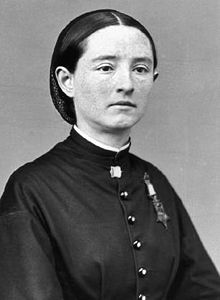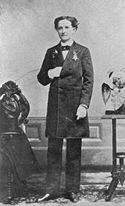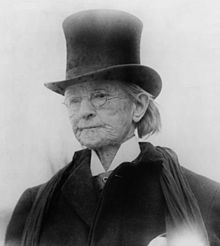- Mary Edwards Walker
-
Mary Edwards Walker 
Dr. Mary Edwards Walker wearing her Medal of HonorBorn November 26, 1832
Oswego, New YorkDied February 21, 1919 (aged 86)
Oswego, New YorkCause of death Natural causes Resting place Rural Cemetery, Oswego, New York Nationality American Education Falley Seminary (1850-1852) Syracuse Medical College (1853-1855) Hygeeia Therapeutic College (1862) Occupation Surgeon Employer United States Army Known for Receiving the Medal of Honor during the American Civil War
1st Female U.S. Army Surgeon
Feminism
Prohibitionist
AbolitionistSpouse Albert Miller Mary Edwards Walker (November 26, 1832 – February 21, 1919) was an American feminist, abolitionist, prohibitionist, alleged spy, prisoner of war and surgeon. She is the only woman ever to receive the Medal of Honor.
Prior to the American Civil War she earned her medical degree, married and started a medical practice. The practice didn't do well and she volunteered with the Union Army at the outbreak of the American Civil War and served as a female surgeon. She was captured by Confederate forces after crossing enemy lines to treat wounded civilians and arrested as a spy. She was sent as a prisoner of war to Richmond, Virginia until released in a prisoner exchange.
After the war she was approved for the United States military's highest decoration for bravery, the Medal of Honor, for her efforts during the war. She is the only woman to receive the medal and one of only eight civilians to receive it. Her medal was later rescinded based on an Army determination and then restored in 1977. After the war she was a writer and lecturer supporting the women's suffrage movement until her death in 1919.
Contents
Early life and education
She was born in the Town of Oswego, New York, on November 26, 1832, the daughter of Alvah (father) and Vesta (mother) Walker. She was the youngest of five daughters and had one younger brother. Walker worked on her family farm as a child. She did not wear women's clothing during farm labor, because she considered them too restricting. Her elementary education consisted of going to the local school where her mother taught. As a young woman, she taught at the school to earn enough money to pay her way through Syracuse Medical College (now Upstate Medical University), where she graduated as a medical doctor in 1855 as the only woman in her class. She married a fellow medical school student, Albert Miller, and they set up a joint practice in Rome, New York. The practice did not flourish, as female physicians were generally not trusted or respected at that time.[1] Walker briefly attended Bowen Collegiate Institute in Hopkinton, Iowa in 1860 until she was suspended after refusing to quit the school, until then, all male debating society.
At the beginning of the American Civil War, she volunteered for the Union Army as a civilian. At first, she was only allowed to practice as a nurse, as the Army had no female surgeons. During this period, she served at the First Battle of Bull Run (Manassas), July 21, 1861 and at the Patent Office Hospital in Washington, D.C. She worked as an unpaid field surgeon near the Union front lines, including the Battle of Fredericksburg and in Chattanooga after the Battle of Chickamauga. Finally, she was awarded a commission as a "Contract Acting Assistant Surgeon (civilian)" by the Army of the Cumberland in September 1863, becoming the first-ever female U.S. Army Surgeon.[2]
Walker was later appointed assistant surgeon of the 52nd Ohio Infantry. During this service, she frequently crossed battle lines, treating civilians. On April 10, 1864 she was captured by Confederate troops and arrested as a spy. She was sent to Richmond, Virginia and remained there until August 12, 1864 when she was released as part of a prisoner exchange. She went on to serve during the Battle of Atlanta and later as supervisor of a female prison in Louisville, Kentucky, and head of an orphanage in Tennessee.[2]
Late career
After the war, she became a writer and lecturer, supporting such issues as health care, temperance, women's rights and dress reform for women. She wrote two books that discussed women's rights and dress. She participated for several years with other leaders in the women's suffrage movement, including Susan B. Anthony and Elizabeth Cady Stanton. The initial stance of the movement, taking Dr. Walker's lead, was to say that women already had the right to vote, and Congress need only enact enabling legislation. After a number of fruitless years working at this, the movement took the new tack of working for a Constitutional amendment. This was diametrically opposed to Mary Walker's position, and she fell out of favor with the movement. She continued to attend conventions of the suffrage movement and distribute her own brand of literature, but was virtually ignored by the rest of the movement. Her penchant for wearing male-style clothing, including a top hat, only exacerbated the situation.[2]
She died February 21, 1919 from natural causes at the age of 86 and is buried in Rural Cemetery Oswego, New York. She had a plain funeral, but an American flag was draped over her casket and she was buried in her black suit instead of a dress.[3] Her death in 1919 came one year before the passage of the Nineteenth Amendment to the United States Constitution which guaranteed women the right to vote.[2]
Honors and awards
Medal of Honor citation
After the war, Walker was recommended for the Medal of Honor by Generals William Tecumseh Sherman and George Henry Thomas. On November 11, 1865, President Andrew Johnson signed a bill to present her the medal, specifically for her services at the First Battle of Bull Run (Manassas).
In 1917, the U.S. Congress, created a pension act for Medal of Honor recipients and in doing so created separate Army and Navy Medal of Honor Rolls. Only the Army decided to review eligibility for inclusion on the Army Medal of Honor Roll. The 1917 Medal of Honor Board never rescinded any medals in 1917 but instead deleted 911 names from the Army Medal of Honor Roll including that of Dr. Mary Edwards Walker and William F. "Buffalo Bill" Cody. None of the 911 recipients were ordered to return their medals although on the question of whether the recipients could continue to wear their medals the Judge Advocate General advised the Medal of Honor Board that there was no obligation on the Army to police the matter. Walker continued to wear her medal until her death.
President Jimmy Carter restored her medal posthumously in 1977.[4]
Attribution and citation
Rank and organization: Contract Acting Assistant Surgeon (civilian), U. S. Army. Places and dates: Battle of Bull Run, July 21, 1861; Patent Office Hospital, Washington, D.C., October 1861; Chattanooga, Tenn., following Battle of Chickamauga, September 1863; Prisoner of War, April 10, 1864-August 12, 1864, Richmond, Va.; Battle of Atlanta, September 1864. Entered service at: Louisville, Ky. Born: 26 November 1832, Oswego County, N.Y.
Citation:
Whereas it appears from official reports that Dr. Mary E. Walker, a graduate of medicine, "has rendered valuable service to the Government, and her efforts have been earnest and untiring in a variety of ways," and that she was assigned to duty and served as an assistant surgeon in charge of female prisoners at Louisville, Ky., upon the recommendation of Major-Generals Sherman and Thomas, and faithfully served as contract surgeon in the service of the United States, and has devoted herself with much patriotic zeal to the sick and wounded soldiers, both in the field and hospitals, to the detriment of her own health, and has also endured hardships as a prisoner of war four months in a Southern prison while acting as contract surgeon; and Whereas by reason of her not being a commissioned officer in the military service, a brevet or honorary rank cannot, under existing laws, be conferred upon her; and Whereas in the opinion of the President an honorable recognition of her services and sufferings should be made. It is ordered, That a testimonial thereof shall be hereby made and given to the said Dr. Mary E. Walker, and that the usual medal of honor for meritorious services be given her.[5]
Other honors
In World War II, a Liberty ship, the SS Mary Walker, was named for her.
In 1982, the U.S. Postal Service issued a 20 cent stamp in her honor.[6]
The medical facilities at SUNY Oswego are named in her honor (Mary Walker Health Center). On the same grounds a plaque explains her importance in the Oswego community.
There is a United States Army Reserve center named for her in Walker, Michigan.
The Whitman-Walker Clinic in Washington, D.C. is named in honor of Dr. Walker and the poet Walt Whitman who was a nurse in D.C. during the Civil War.[4]
Bibliography
- Mary Edwards Walker; United States. Congress. House. Committee on the Judiciary, Edward Thomas Taylor, Jane Addams (1912). Woman suffrage, No.1: hearings before the Committee on the Judiciary, House of Representatives, Sixty-second Congress, second session, statement of Dr. Mary E. Walker. February 14, 1912. Government Printing Office. http://books.google.com/books?id=RMwTAAAAIAAJ&printsec=frontcover&dq=%22Mary+Edwards+Walker%22&cd=2#v=onepage&q=&f=false. Retrieved February 11, 2010.
- Walker, Mary Edwards (1871). HIT. The American news company. http://books.google.com/books?id=Qk4WAAAAYAAJ&printsec=frontcover#v=onepage&q=&f=false. Retrieved February 11, 2010.
See also
- List of American Civil War Medal of Honor recipients: T–Z
- Sarah Taylor (soldier)
- Malinda Blalock
- Albert Cashier
- Sarah Emma Edmonds
- Loreta Janeta Velazquez
- Laura J. Williams
- Mollie Bean
References
- ^ Walker, 2010, pp. 26-27
- ^ a b c d Walker, Dale L. (2005). Mary Edwards Walker: Above and Beyond. Macmillan. ISBN 978-0-7653-1065-1. http://books.google.com/books?id=BIuvXw6ky1AC&printsec=frontcover&dq=%22Mary+Edwards+Walker%22&cd=1#v=onepage&q=&f=false. Retrieved February 11, 2010.
- ^ "Mary Edwards Walker". Claim to Fame: Medal of Honor recipients. Find a Grave. http://www.findagrave.com/cgi-bin/fg.cgi?page=gr&GRid=23089. Retrieved January 1, 2008.
- ^ a b "About Whitman-Walker clinic". Who Were Whitman and Walker. Whitman-Walker clinic. http://www.wwc.org/about_wwc/history.html. Retrieved March 1, 2010.
- ^ "Medal of Honor recipients". Medal of Honor citations. United States Army Center of Military History. June 8, 2009. http://www.history.army.mil/html/moh/civwarmz.html. Retrieved February 11, 2010.
- ^ Walker, 2010, pp. 21-22
Further reading
- Mary Edwards Walker; United States. Congress. House. Committee on the Judiciary, Edward Thomas Taylor, Jane Addams (1912). Woman suffrage, No.1: hearings before the Committee on the Judiciary, House of Representatives, Sixty-second Congress, second session, statement of Dr. Mary E. Walker. February 14, 1912. Government Printing Office. http://books.google.com/books?id=RMwTAAAAIAAJ&printsec=frontcover&dq=%22Mary+Edwards+Walker%22&cd=2#v=onepage&q=&f=false. Retrieved February 11, 2010.
- Mikaelian, Allen; Wallace, Mike (2003). Medal of Honor: Profiles of America's Military Heroes from the Civil War to the Present. Hyperion. pp. 1–18. ISBN 0-7868-6662-4. http://books.google.com/books?id=Qk4WAAAAYAAJ&printsec=frontcover#v=onepage&q=&f=false. Retrieved February 11, 2010.
External links
- "Mary Edward Walker". http://ngeorgia.com/ang/Mary_Edwards_Walker. Retrieved October 4, 2010.
- "Mary Edwards Walker". Hall of Valor. Military Times. http://www.militarytimes.com/citations-medals-awards/recipient.php?recipientid=2319. Retrieved February 11, 2010.
- "National Library of Medicine, Dr Mary Edwards Walker Biography". http://www.nlm.nih.gov/changingthefaceofmedicine/physicians/biography_325.html. Retrieved February 26, 2010.
- "Mary Edwards Walker". http://www.lkwdpl.org/wihohio/walk-mar.htm. Retrieved February 26, 2010.
- "Town of Oswego Historical Society". http://www.townofoswego.com/historical.html. Retrieved February 26, 2010.
- "St. Lawrence County, New York Branch of the American Association of University Women". http://www.northnet.org/stlawrenceaauw/walker.htm. Retrieved February 26, 2010.
Categories:- 1832 births
- 1919 deaths
- American Civil War surgeons
- American spies
- American surgeons
- American women's rights activists
- Civilian recipients of the Medal of Honor
- People from Oswego, New York
- Women in the American Civil War
- American Civil War prisoners of war
- Women physicians
- Purged Medal of Honor recipients
- United States Army personnel
Wikimedia Foundation. 2010.


